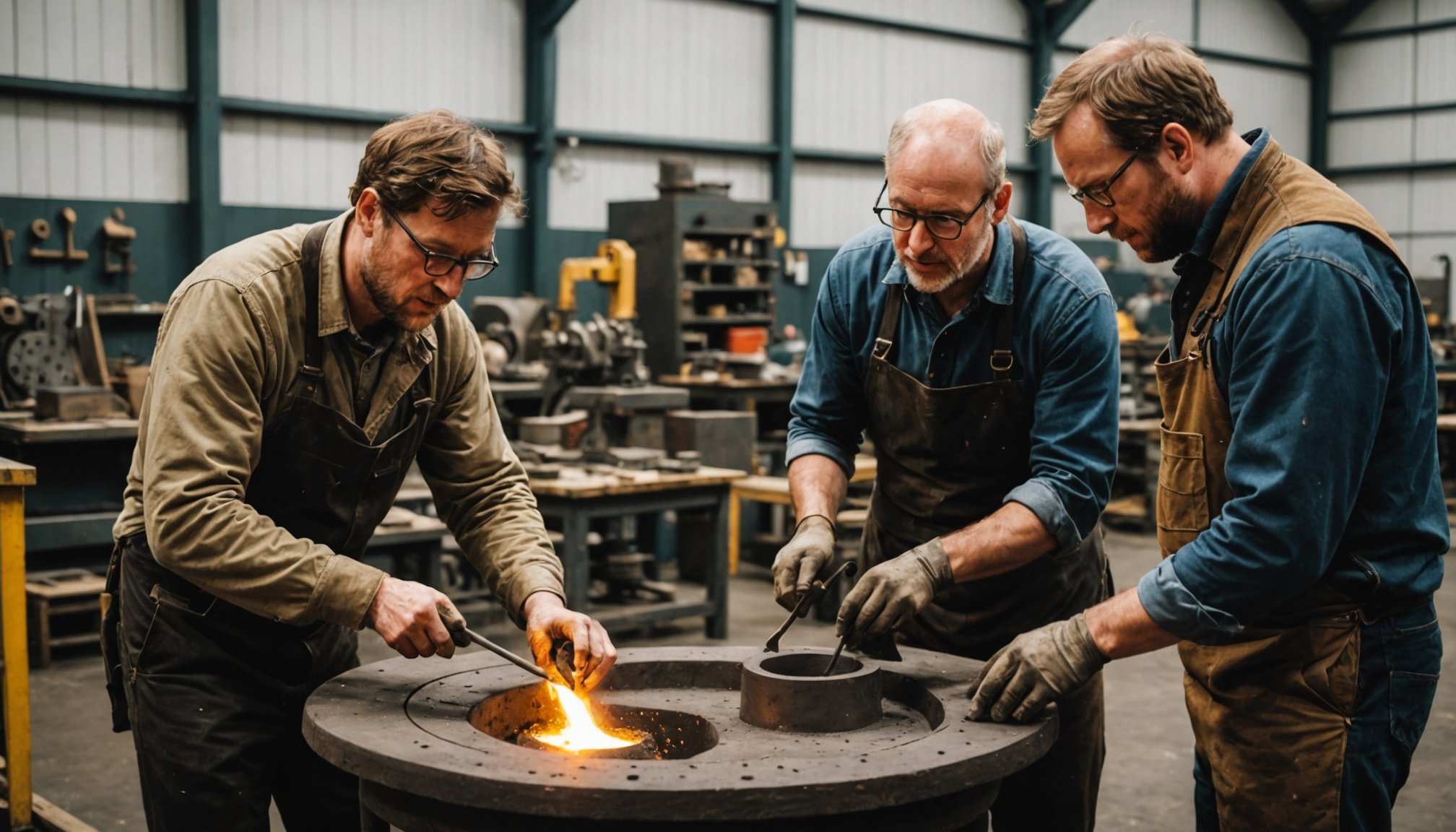Overview of British Metal Casting History
British metal casting boasts a rich and storied past, illustrating an impressive evolution influenced by numerous innovations. The historical development began as early as the Bronze Age, with the crafting of tools and ceremonial artefacts. As centuries rolled on, significant advancements were made during the Industrial Revolution, establishing Britain as a leader in the field.
Key periods and innovations that dramatically shaped the industry include the introduction of the blast furnace in the 15th century and the development of the sand casting process. These breakthroughs not only advanced British metal casting but also set standards globally. The significance of metal casting in Britain is underscored by its profound impact on both culture and economy, fostering an industry that generates employment and inspires artistic expression.
Have you seen this : Dive into Engaging Interactive Workshops: Unveiling the Rich History of British Naval Chart Crafting
Historically, metal casting supported local cultures by producing everyday items, from tools to ornamental pieces, rendering it a vital trade. Today, metal casting is celebrated as both an artisan’s craft and a linchpin of engineering industries. Its continued evolution reflects Britain’s ongoing commitment to innovation and the preservation of its industrial heritage.
Notable Workshops in British Metal Casting
Metal casting workshops in Britain offer immersive experiences that captivate both novices and aficionados. These workshops bring historical techniques to life while integrating modern practices. Attendees can immerse themselves in educational events, gaining a hands-on understanding of the craft. Prominent workshops include those held at foundries with rich heritage or contemporary art spaces that provide a unique educational environment.
Also to read : Discover Fascinating British Shipbuilding Workshops: Embark on a Historical Journey Today!
Unique Offerings and Activities
Workshops often feature activities such as live demonstrations, interactive sessions, and opportunities to create personal metal works. These interactive experiences highlight the practical application of traditional methods while introducing attendees to innovative tools used by professional artists and metal casting experts. This combination fosters a deeper appreciation of the artistry behind metal casting.
Importance of Hands-On Learning
Hands-on learning is crucial for mastering metal casting techniques. Workshops emphasize practical engagement, allowing participants to experience the tactile nature of the craft. By actively participating, attendees gain firsthand knowledge of the intricate processes involved, such as moulding, melting, and pouring metal. This experiential learning approach significantly enhances one’s understanding and appreciation of metal casting, reinforcing its historical and cultural significance.
Engaging with these educational events not only nurtures artistic talent but also cultivates an appreciation for the evolution of metal casting technologies through the centuries.
Featured Instructors and Experts
Workshops in British metal casting provide opportunities to learn from renowned artists and experienced professionals. These experts are pivotal in shaping participants’ experiences, offering unique insights into metal casting artistry.
Instructor Profiles
In examining the professional artists involved in these workshops, their profiles often detail extensive backgrounds in both historical and modern casting techniques. Through a blend of academic prowess and practical expertise, these instructors guide participants in mastering complex skills.
Experience Highlights
Experts at these educational events often have impressive portfolios marked by notable achievements in the industry. Many have contributed to significant projects or innovations, rewarded with industry recognition. Their experiences enrich the learning environment, offering participants a comprehensive view of metal casting’s potential.
Teaching Philosophy
The teaching philosophy of these artists centres on fostering an understanding of both traditional and contemporary techniques. Emphasising hands-on learning, they create interactive sessions that encourage exploration and adaptability. This method not only enhances technical skills but also inspires creativity and innovation in attendees.
Such instruction helps cultivate a deeper appreciation of Britain’s rich metal casting heritage, bridging the gap between craft and industry in meaningful ways.
Visitor Experiences and Testimonials
Attending a metal casting workshop in Britain leaves visitors with memorable experiences, drawing them into the craft’s rich narrative. Through their feedback, a common theme emerges: the workshops provide not only technical insights but also a personal connection to metal casting heritage.
Participants frequently commend the workshops for their immersive experiences, praising the blend of hands-on activities and informative sessions. These workshops often balance practical involvement with theoretical knowledge, fostering a sense of accomplishment and understanding in attendees. Notably, many testimonials highlight the engaging nature of live demonstrations and the transformative impact of creating their own metal works.
Feedback commonly reflects appreciation for the expertise of instructors, citing their ability to convey complex techniques in an approachable manner. This guidance aids participants in visualising historical processes and innovations within a modern context.
Overall, these testimonials underscore the workshops’ role in enhancing visitors’ understanding of metal casting. Such environments cultivate an appreciation for the art and science behind the craft, making it an enriching experience for novices and seasoned learners alike.
Practical Information for Visitors
Planning your visit to British metal casting workshops requires knowledge of booking procedures, accessibility, and what attendees can anticipate.
How to Book a Workshop
Booking workshops is straightforward and user-friendly, ensuring accessibility for all interested. The process typically involves visiting the workshop’s official website, where you can find a calendar of available dates. Select a suitable date, fill in the necessary registration details, and confirm payment. Ensure you book well in advance, as slots often fill quickly due to the workshops’ popularity.
Accessibility Options
Workshops strive to be inclusive, offering diverse accessibility options for all participants, including facilities for disabilities. Venues are equipped with ramps, elevators, and accessible restrooms. It is recommended to contact the organisers ahead of time to address specific needs or accommodations.
What to Expect During Attendee Experience
Participants can anticipate a comprehensive and engaging experience during their time at the workshop. Attendees are usually greeted with a brief orientation, followed by immersive segments that blend hands-on activities with insightful presentations. Expect to engage in the metal casting process at various stages, guided by expert instructors eager to share their passion and knowledge. This approach ensures a rich blend of educational value and personal involvement.
Historical Sites and Locations for Workshops
Dive into the storied world of British metal casting at iconic historical sites. These venues offer a unique blend of educational insights and rich heritage, making workshops a distinctly memorable experience.
Britain boasts numerous significant locations where workshops are conducted, each site symbolising milestones in the metal casting industry. Notable venues include old foundries that have been pivotal in historical developments. These sites not only provide a backdrop steeped in history but also enhance the learning experience by integrating the historical evolution of the craft into contemporary workshops.
Participating in workshops at historically relevant locations allows attendees to connect with a past era, providing a deeper understanding of metal casting’s roots. These environments often inspire respect and appreciation as they highlight the economic and cultural significance of the craft throughout the centuries.
The benefits of learning in such historically rich surroundings are manifold. These venues provide a sense of authenticity, allowing participants to visualize the practices of old while engaging with modern techniques. This connection fosters a holistic understanding of metal casting, bridging the gap between history and present-day artistry. Attendees leave with a profound appreciation for both the craft and its enduring legacy.










